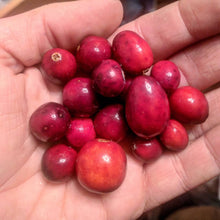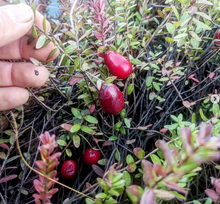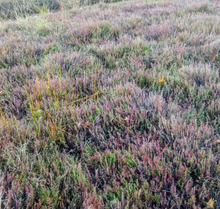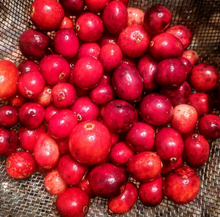Pine Barrens Cranberry
Regular price
$3.75
Sale
Vaccinium macrocarpon
Origin: Burlington County, New Jersey
Improvement status: Cultivated material
Seeds per packet: ~20
BOTANICAL SAMPLE - NOT GERMINATION TESTED
Life cycle: Perennial
Cranberries have grown in the New Jersey Pine Barrens since long before humans arrived to appreciate them. Native Americans harvested them by hand and dried them for future use. European settlers fashioned wooden scoops to harvest the berries. Since the 1960s, most berries have been "wet harvested" by flooding cranberry fields, knocking off berries with special machinery, then harvesting the berries that float to the surface. The berries have played a critical role in the culture of the Pine Barrens. Elizabeth Coleman White domesticated the blueberry at her family's cranberry farm in Whitesbog, NJ. Elizabeth Lee invented and popularized "Cranberry Sauce" from her farm in New Egypt, NJ, and was one of three founding members of the Ocean Spray cooperative.
For those who have never been to the Pine Barrens, do yourself a favor and take a trip there someday. New Jersey has a reputation as a small state, but the Pine Barrens wilderness is truly vast. You can hike or bike or even drive for hours within its boundaries and not see another person. But it's hard to travel very far without finding extraordinary animals and plants, including some that exist nowhere else. Since much of the land now preserved for nature was formerly cultivated, evidence of human use is all around, from artesian springs that still bubble up from rusty pipes to abandoned blueberry fields and cranberry bogs.
These seeds were collected from cranberries harvested from abandoned cranberry bogs in the NJ Pine Barrens. We assume they come from different heirloom varieties, and likely from seedlings of such varieties. Cranberries are evergreen perennial tuft-forming groundcover plants. They are easy to grow from seed if protected from weeds in their first couple years.
NOTE: Because we have a limited amount of these seeds and each seed is unique and potentially precious, we do not conduct germination tests (which would require sacrificing hundreds of seeds) on breeding mixes like this one. But these seeds were collected in 2022 and processed following our typical best practices. If buyers are unsatisfied, please contact us.








